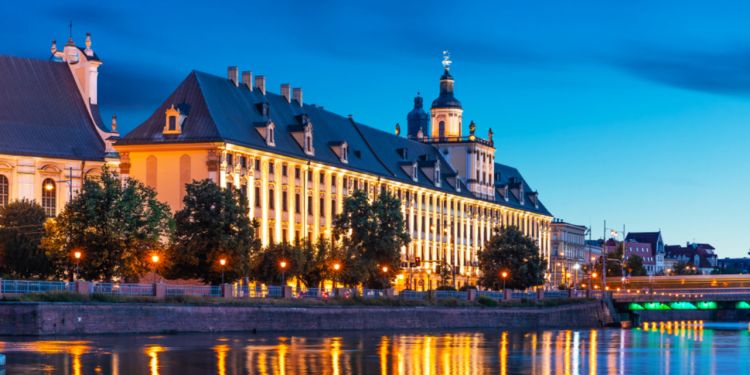
Looking forward to studying in Poland? Find out useful information about the country’s higher education system, university enrolment process, student life, and more in this article.
Poland's higher education system is one of the oldest in the world and dates all the way back to the establishment of Cracow Academy in 1364. Today, the country is home to over 420 universities and a student population of over 1.5 million. Polish diplomas are recognised throughout Europe and beyond, which makes the country a popular destination for foreign undergraduates. While the majority of courses are offered in Polish (about 5,000), there are also programs available in English and other languages.
Higher education system
The Pole higher education system is greatly developed, providing quality education in a professional framework. There are two types of higher education institutions in the country: academic institutions (universities, polytechnic universities, academies) and vocational institutions.
There are undergraduate, graduate, and postgraduate course programs. Typically, undergraduate courses last for three to four years are intended for baccalaureate holders. Note that students must have obtained 180 credits (ECTS) to pass this level. An internship is also included in the program.
Graduate courses, for their part, last for one and a half to two years. At the end of these courses, you will be entitled to a Masters degree or its equivalent. Students are expected to receive at least 90 credits (ECTS) and a new internship is involved.
Finally, postgraduate courses, which are equal to a doctorate, generally last for three to four years. On completing these courses, you will be entitled to a scientific Doctor's degree. However, you must have successfully completed your graduate courses beforehand.
Enrolment, registration and tuition fees
The specifics of the enrolment procedure for foreign students may vary slightly from one university to another. Thus, it's a good idea to inquire about the exact requirements at the international relations office of your chosen university.
General requirements for enrolling in a university in Poland include having a secondary education (or higher degree), possessing the necessary language skills for your chosen program, and complying with student visa requirements in accordance with your country of residence.
Typically, you will be asked to produce the following documents together with your application:
- a school leaving certificate or a diploma (such as the baccalaureate), letting you apply for graduate or post-graduate programs in your home country
- all other diplomas obtained during your post-secondary education (your degree, for instance)
- five copies of your valid identity card or passport
- internship or labour certificates
- a personal cover letter
Other documents may also be requested by your chosen university, so it's always a good idea to check with the admissions department in advance.
Regardless of the university, school or academy you have chosen, you will have to produce a school leaving certificate or a diploma (such as the baccalaureate) during enrolment procedures. You also have to produce all other diplomas obtained during your post-secondary education (your degree, for instance), five copies of your valid identity card or passport, internship or labour certificates, and a personal cover letter. Other documents may also be requested, depending on the university. So make sure to inquire with the university beforehand.
Full-time study at a Polish university in the Polish language is free for the country's citizens as well as residents of the EU/EEA and those holding the certificate confirming their Polish origins (Karta Polyaka).
Other international students are required to pay university tuition fees, which are typically established by the educational establishment itself.
Fees apply as follows:
- some 2,000 euros per year in the case of undergraduate or graduate long-term courses
- around 3,000 euros per year in the case of postgraduate or doctorate courses, medical internships, arts and research, specialisation courses, and postgraduate internships
- around 2,000 euros per year in the case of language courses, including Polish.
If you have enrolled in a private university or higher education institution, you will need an average of 2,000 to 6,000 euros per year. These can even reach up to 8,000 to 12,000 euros per year in the case of MBA programs.
Student life
With a large number of students in the country, student life in Poland is interesting and diverse, especially if you reside in one of the country's largest cities: Warsaw or Krakow. Wroclaw is one of the country's oldest cities and houses the famous Wroclaw University. Lodz, Poland's third largest city, is located in the centre of the country and is home to one of the country's best-ranked universities ' Lodz University. Poznan is also a great option: it's one of Poland's most well-known student cities with a large student population and over 25 universities.
There is an abundance of activities to choose from whether it's language courses, cultural festivals, nightlife, exhibitions, concerts, museums, and more. A large number of Polish residents speak English, so, you will be able to enjoy your social life even if your knowledge of Polish is limited.
One of the main advantages of student life in Poland is the relatively low cost of living compared to other European countries.
Useful links:
Go Poland! ' Ministry of Science and Higher Education
Study in Poland
European University Directory ' Poland
We do our best to provide accurate and up to date information. However, if you have noticed any inaccuracies in this article, please let us know in the comments section below.








